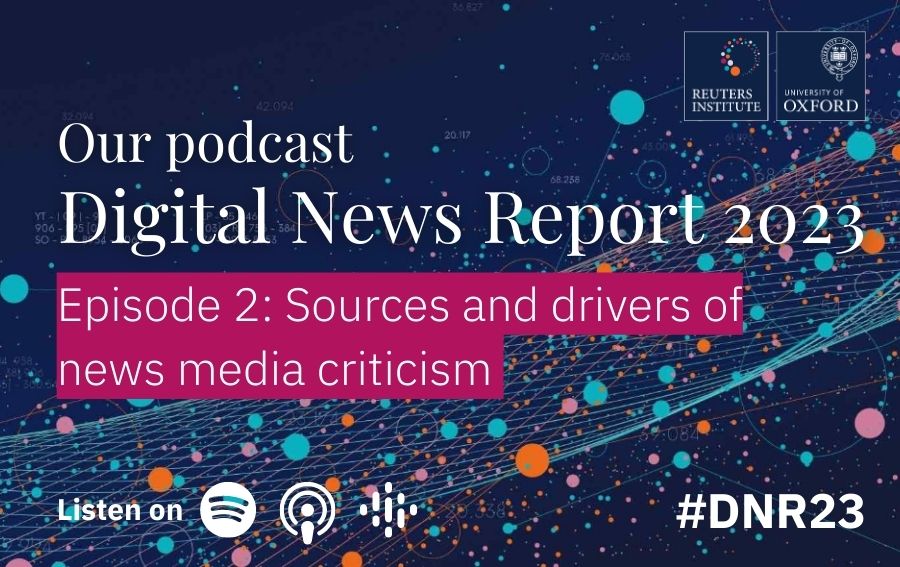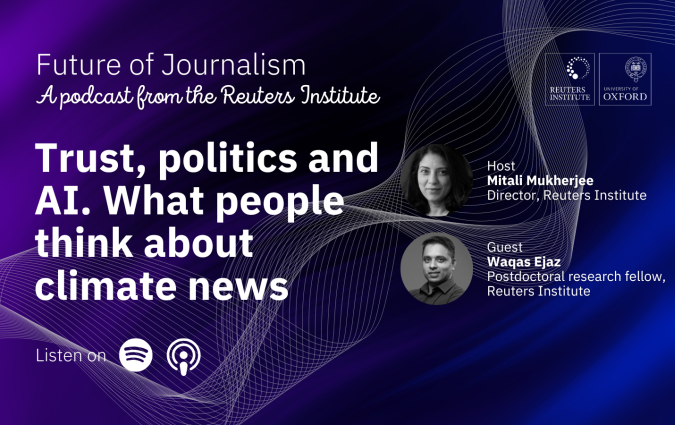Our podcast: Digital News Report 2023. Episode 2: Sources and drivers of news media criticism

In this episode of our Digital News Report 2023 podcast series we look at how people say they encounter criticism of the news media, who’s saying it and where. We explore critical differences between countries, how age and political leaning plays a part and how much the news media should be concerned about this.
The speakers:
Craig T. Robertson is a postdoctoral research fellow at the Reuters Institute for the Study of Journalism. His research focus includes news trust and credibility, fact-checking and verification, and how both partisan attitudes and epistemic beliefs factor into these domains. He is the author of the Digital News Report 2023 chapter on sources and drivers of news media criticism.
Our host Federica Cherubini is Director of Leadership Development at the Reuters Institute. She is an expert in newsroom operations and organisational change, with more than ten years of experience spanning major publishers, research institutes and editorial networks around the world.
The podcast
The transcript
Understanding media criticism | Regional differences | Sources of media criticism | Demographic factors | The role of platforms
Understanding media criticism ↑
Federica: One of the key questions you looked at in this chapter was asking news users how often they saw or heard people criticise the media in the country where they live. Can you break down what this question is getting at, and what the overall findings were?
Craig: Definitely. So the first question we asked about news media criticism was really straightforward. It was, as you said: ‘How often, if at all, do you see or hear people criticising journalists or the news media in your country?’
We wanted the question to be deliberately broad so it would capture all forms of perceived criticism. And I say perceived for a good reason. What one person may see as criticism of the news media may not be seen as criticism by someone else. For instance, one person might criticise a news outlet for being too left wing or right-leaning. Someone else might not see that as a problem, since some news outlets can take different political stances – it means at the end of the day they balance each other out.
It was also framed broadly so we would include all forms of criticism: from the fair to the unfair. And again, here, what one person may see as fair criticism may be seen as unfair to someone else. So a news outlet might be criticised for bias or misrepresentation. And another person may not see bias or misrepresentation at all.
But what we’re interested in, overall, fundamentally is how often people said they saw criticism of news and journalism of any kind
In terms of the broad findings, across all the markets we cover – which is 46 markets – half of people (53%) say they ‘very often’ or ‘quite often’ see criticism of the news media. And only 38% of people say they don’t see criticism very often, or at all.
And what’s interesting in our findings – across all our markets – is that this exposure to criticism is pretty even across demographics. So it’s pretty even across men and women, across age groups. Political partisans on the left and right do say they see a bit more criticism than people in the centre but the differences aren’t that large.
Regional differences ↑
Federica: Was what you found broadly similar across all countries?
Craig: So it’s across countries where you start to see differences. Some countries report a lot more exposure to media criticism than others. At the high end we have countries like Peru, Greece, Argentina. In these countries, two-thirds of people say they are frequently exposed to news media criticism.
It’s interesting that the US and UK are in the middle of the pack. In the US you’ve got polarised politics, with media being criticised on all sides. And it’s pretty similar in the UK with polarisation. So you’d think the US and UK would be near the top in terms of reported exposure. But, then, saying that, reported levels of exposure to criticism are still pretty high. Almost 60% of people in the US and around 50% of people in the UK say they see criticism frequently.
At the lower end, we have European countries like Germany, Switzerland, and Denmark. And Asian markets like Singapore and Japan. Only 22% of people in Japan say they see criticism frequently. And it’s a third of people in the other countries I just mentioned. That’s in contrast to the two-thirds of people at the other end of the scale – high criticism markets like Greece and Peru.
Federica: What could explain regional differences?
Craig: A key factor that I think influences findings is politics. Criticism of the news media is so tied to politics. So in Peru, you have political turmoil going on – there’s instability, polarisation. The National Association of Journalists in Peru said 2022 was the worst year of this century for journalists in the country. They recorded over 300 incidents involving journalists, covering things like threats, harassment, verbal attacks, and political attacks. Things like this get worse at times of political turmoil, when there’s political anger so the news media get caught up in the middle of it obviously. There’s more criticism of the news media – and more exposure to criticism – when people are angry, when different sides are in opposition to each other.
And it’s the same in Greece. The government in Greece was very critical of Reporters Without Borders for downgrading the country in its press freedom rankings. Greece has slipped down to about 107 out of 180 countries in the press freedom rankings. You have the Prime Minister in Greece calling the RSF report ‘crap’ and calling out anti-government newspapers. And then, on the other side, you have people being critical of the state media and, of course, critical of the Greek government. Again, when people are angry, when different sides are in opposition, again you’re going to see more media criticism.
So yeah, overall, when you have polarised politics, different sides being angry at each other, and the news media being caught up in the middle that’s when you tend to see high levels of media criticism being reported by the public.
In some of the less-polarised environments – like, say, Norway – you see less criticism being reported by the public. That’s not to say that nobody in Norway sees media criticism is mad at the media, or that it’s a utopia of some kinds. It’s just that there is less exposure to criticism being reported. And that’s likely because it’s less polarised and tumultuous compared to other countries.
Sources of media criticism ↑
Federica: Where do people say it’s coming from, this criticism of the news media?
Craig: The main source – and this links to what I was just saying – is politicians and political activists. This is the most common source of media criticism that people report seeing. Across all 46 of our markets, 42% of people exposed to criticism say they’ve seen it from politicians.
After that, you have everyday people at 40% and people you know – like friends and family – at 38%. Much lower down is criticism from other journalists or other media, which is just 27%.
The fact that politicians are the main source of criticism – this isn’t surprising to me, as someone who studies news and politics. Politicians have always criticised the news media – and it’s a big part of their playbook. Think of people like Donald Trump calling the media ‘fake news’. And people like Orban in Hungary, or Erdogan in Turkey. They use criticism of the media as part of strategies to maintain and reinforce their power. It works for these politicians to be critical of the news media, because their supporters will follow what they stop believing or paying attention to news outlets that do tough political journalism. It benefits them, so they keep doing it. In the end, this means that politicians come out as the main source of media criticism.
But it’s not just these types of leaders, of course. Donald Trump’s criticisms of the media can be called pretty unfair – he likes to attack journalists for reporting things that are bad about him. But, on the other side, you can have criticism from politicians which is pretty fair. When Fox News was spreading conspiracy theories about the 2020 election being stolen, criticism from politicians and other people arguably seems pretty fair and it’s why they got taken to court by Dominion Voting Systems.
Federica: Should news media be concerned that it’s political figures who are cited as the most frequent source of media criticism, rather than members of the public, influencers, or other individuals that people cite?
Craig: I guess it depends on what the criticism looks like – and how that directly manifests in the world. It’s important to point out that not all criticism is bad. Nor is all criticism uncalled for. The news media are pretty powerful. They criticize people all the time in their reporting. So it’s often healthy that the media get some pushback. Being criticized comes with the territory. If you’re reporting negative things about a prime minister or president, it’s not surprising if you get a bit of pushback. It’s politics.
But where I think there is cause for concern – it’s when criticism from politicians is not just pushback. It’s when the criticism is vitriolic or vicious. It’s when the criticism is targeted, and when people are encouraged to act on it, basically. There were times when Donald Trump, for instance, encouraged his supporters to confront the news media.
We know from years of research on elite cues and how people form opinions about politics and politicians. Politicians are a very important – and very powerful – source of influence. It was very evident in the way that Trump’s supporters responded to his criticism of the media. They went off and harassed journalists online and offline. And we’ve seen the same happen in Brazil, Mexico, the Philippines. Angry criticism of the media has become a key part of the political playbook and can become cause for concern.
It's when the criticism veers into violent rhetoric that we should be concerned – because this criticism doesn’t always just remain as a verbal thing. Sometimes criticism leads to violence against journalists. Demagogues love to attack the press. And sometimes the criticism is very deliberate and coordinated. I think we can point to the Philippines as a good example of where this happens. Journalists are systematically targeted in the Philippines. They are called communists or terrorists. And these journalists worry for their safety. Journalists in the Philippines have been killed. Politicians and their allies have contributed to this kind of atmosphere.
It's a similar story in Mexico, where AMLO [President Andrés Manuel López Obrador] constantly calls the news media ‘fake’. It’s not great in a country which has such high numbers of journalists being killed as well.
Federica: Are there any countries where politicians aren’t the most frequently cited sources of media criticism?
Craig: Interestingly, it’s the UK. In the UK, celebrities, comedians, and social media personalities are actually the most frequently cited source of criticism. Around half of people in the UK report being exposed to criticism coming from celebrities. And I think one prominent source of this criticism can be pointed to right now: Prince Harry.
You have Prince Harry suing Mirror newspaper group for alleged phone hacking. This is part of a long story of the UK press – tabloid newspapers in particular – being accused of phone hacking, and in some cases being found to have done it, proven to have done it. Prince Harry wasn’t in court at the time our survey was done, in January, (that’s important to point out) but he was still criticising the media for how they treated him and his wife Meghan. Prince Harry in general has been pretty critical of the press and very outspoken for how they’ve treated him. And that extends back to how they treated his mother, Princess Diana.
So in this context it’s perhaps not surprising that celebrities and other UK figures are the main source of criticism that people cite.
And this criticism in the UK is perhaps one other example where criticism is fair. The UK press have done some pretty bad things over the years – often to celebrities. And when these celebrities push back to protect their privacy and their reputations, I think you can call that pretty fair. The press does need to be held to account too for their actions.
Demographic factors ↑
Federica: What role does age play in the sources of news criticism that people are exposed to?
Craig: As I said at the start of the podcast, age doesn’t seem to play much of a role in the amount of criticism people see. Young and old are quite similar in how much criticism they see from various sources. But age does seem to matter a little bit when it comes to where his criticism comes from.
So older people are more likely than younger people to report seeing criticism from politicians. And I think this is probably because older people just pay more attention to politics and politicians. When you pay more attention to politicians, you’re more likely to see the criticism that’s being spread by these sources.
For younger people, they are slightly more likely than older people to report seeing criticism from celebrities. And I guess, this is again about attention. Younger people just pay more attention to celebrities than older people. They pay more attention to social media personalities – so they are more likely to report seeing the criticism spread by these sources.
The role of platforms ↑
Federica: You didn’t just look at who the criticism of news media is coming from, but where people are seeing it. What were your overall findings?
Craig: Beyond the sources of criticism like politicians or celebrities, we also asked people where or how people were seeing criticism – basically the platforms of criticism. Were people seeing this criticism on social media? In the news media itself, so news media reporting on other media? Or were they picking it up from discussions with people they know, so offline discussions with people?
By far the most common way people say they are exposed to criticism is via social media. Half of people report this as the place where they saw news media media criticism. Compare this to a third of people who say they saw criticism via other media – or a third who heard criticism in discussions with people they know.
And again, it’s perhaps not very surprising that social media is the main source that people report seeing media criticism from. It’s because there is just so much opportunity for people to come across critical content from all types of sources – whether they’re everyday people on Facebook, politicians on their Twitter accounts, or celebrities on their Instagram, there’s just a lot more more media criticism to be seen on social media so it’s not surprising it’s the main source that’s cited.
When it comes to age, there are also some differences here. So younger people are much more likely than older people to report seeing criticism on social media. That’s likely because they just spend way a lot more time there.
On the other hand, older people are much more likely to report seeing criticism via the news media. That’s media outlets criticising other media outlets, Fox News criticising CNN, CNN criticising Fox News. And this is likely because older people pay more attention to traditional sources than younger people do.
But yeah, overall, social media is a major source of criticism that people cite. And this criticism might be seen as fair or unfair. It depends on the lens you’re seeing it through and who it’s coming from. So overall, in some cases criticism may be and it’s necessary to help push journalists better to make journalism better. If journalists are misrepresenting people, failing communities, causing harm, then overall criticism can useful. It’s just that, on the other hand, it can become dangerous – especially when it’s angry criticism being encouraged by politicians and then spread by people across social media. In countries with poor and declining press freedom, this can be a really bad thing for journalists’ safety.
Federica: Craig, thank you so much for helping us understand the findings from this chapter of the Digital News Report.
Craig: Thanks for having me.
Listen to all episodes
In every email we send you'll find original reporting, evidence-based insights, online seminars and readings curated from 100s of sources - all in 5 minutes.
- Twice a week
- More than 20,000 people receive it
- Unsubscribe any time





